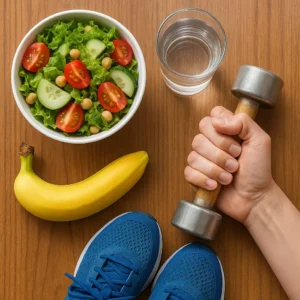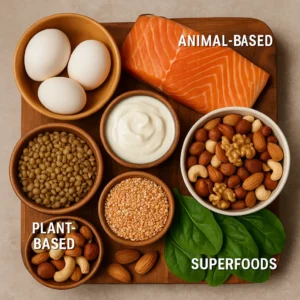Why Do You Feel Hungry After Eating? The Science Behind Post-Meal Hunger
Have you ever finished a meal only to feel hungry again within an hour? You’re not alone. This confusing phenomenon—known as post-meal hunger—frustrates millions of people worldwide.
Instead of blaming yourself for “overeating” or lacking willpower, it’s important to understand that biology, hormones, and even emotions play a huge role. Recent studies show that post-meal glucose dips strongly predict appetite and energy intake (Nature Metabolism, 2021).
In this blog, we’ll explore:
-
The science of post-meal hunger
-
Hormones and brain chemistry involved
-
Emotional and lifestyle triggers
-
Scientifically proven ways to stay satisfied longer
-
Real-life examples you can relate to
-
A practical checklist to keep hunger in check
The Science of Post-Meal Hunger

Glycemic Dips: The Hidden Culprit
A groundbreaking study published in Nature Metabolism tracked thousands of participants and found that people who experienced steeper blood sugar dips 2–3 hours after eating felt hungrier and consumed more calories later in the day.
Why? Because when your blood sugar rises sharply from a meal (especially high-carb foods like white rice, sweets, bread) and then drops quickly, the brain interprets it as an energy shortage. Even if you technically “just ate,” your body feels like it’s starving again.
Satiety Hormones at Work
Your body depends on hormones to regulate hunger and fullness. When these signals get disrupted, you may feel hungry after meals:
-
Leptin → The “fullness hormone.” If you develop leptin resistance (common in obesity), your brain stops responding to satiety signals.
-
Ghrelin → The “hunger hormone.” Ghrelin levels should drop after eating—but in some cases, they stay high, tricking your body into thinking you need more food.
-
Insulin → Helps glucose enter cells. Rapid insulin spikes can lead to sudden dips, triggering hunger and cravings.
The Role of Meal Composition
Research highlights that meals low in protein or fiber do not activate strong satiety signals. On the other hand, highly processed foods digest too quickly, leaving you unsatisfied.
👉 That’s why eating a plate of white rice with fried snacks makes you hungrier faster than eating brown rice with dal, veggies, and curd.
Common Causes of Hunger After Eating

✔ Low Protein Intake – Protein stabilizes blood sugar and keeps you full. Without it, hunger strikes sooner.
✔ Low Fiber Foods – Fiber slows digestion, expands in your stomach, and signals fullness to the brain.
✔ High Glycemic Foods – Sugary drinks, pastries, white bread → rapid spikes & crashes.
✔ Hormonal Imbalances – PCOS, thyroid issues, or leptin resistance can make hunger harder to regulate.
✔ Dehydration – Thirst is often mistaken for hunger.
✔ Emotional Eating – Stress, boredom, or sadness trigger cravings that have nothing to do with physical hunger.
✔ Too Little Sleep – Lack of sleep increases ghrelin (hunger) and lowers leptin (satiety).
The Emotional Impact of Post-Meal Hunger
Feeling hungry soon after eating doesn’t just affect your stomach—it impacts your emotions and self-esteem.
-
Frustration: “Why is my body betraying me?”
-
Guilt: People often blame themselves for “overeating.”
-
Anxiety: Constant hunger can create a sense of being out of control.
👉 Remember—it’s not weakness, it’s biology. Your body is responding to hormone and glucose fluctuations, not a lack of discipline.
How to Beat Post-Meal Hunger: Scientifically Proven Strategies

-
Prioritize Protein
-
Aim for 20–30g of protein per meal.
-
Breakfast: Eggs, Greek yogurt, or paneer bhurji
-
Lunch/Dinner: Dal, beans, tofu, lean chicken, or fish
-
Snacks: Nuts, roasted chana, protein smoothies
-
-
Add Fiber Power
-
Fill half your plate with veggies/salads
-
Choose whole grains (brown rice, quinoa, millets) instead of refined carbs
-
-
Choose Low-Glycemic Foods
-
Swap: White bread → Whole grain
-
Swap: Sugary drinks → Lemon water, buttermilk
-
Swap: Pastries → Seasonal fruits
-
-
Hydrate Mindfully
-
Drink 1–2 glasses of water before meals. Often, dehydration is mistaken for hunger.
-
-
Sleep 7–8 Hours
-
Consistent sleep regulates leptin and ghrelin, preventing unnecessary cravings.
-
-
Stress Management
-
Meditation, journaling, yoga, or even a 10-minute walk outdoors can drastically reduce emotional hunger.
-
-
Mindful Eating
-
Eat slowly, chew well
-
Put away your phone while eating
-
Allow your brain 15–20 minutes to register fullness
-
Long-Term Benefits of Fixing Post-Meal Hunger
🌱 Weight stability – Prevents overeating and yo-yo dieting.
⚡ Better energy – No mid-day crashes or brain fog.
😊 Improved mood – Balanced hormones = balanced emotions.
🫀 Metabolic health – Reduces risk of insulin resistance, diabetes, and obesity.
Quick Checklist for Satiety (Stick on Your Fridge!)

✔ Add protein to every meal
✔ Eat at least 25g fiber daily
✔ Drink 8 glasses of water
✔ Limit refined carbs & sugar
✔ Sleep 7–8 hrs + manage stress
✔ Practice mindful eating
Additional Tips from Nutrition Science
-
Small, balanced meals → Instead of 2 heavy meals, try 3–4 moderate ones.
-
Add healthy fats → Nuts, seeds, avocado, coconut oil improve satiety.
-
Avoid liquid calories → Juices and sodas don’t trigger fullness signals.
-
Check medical causes → PCOS, thyroid issues, or insulin resistance may need medical attention.
Feeling hungry after meals isn’t a personal flaw—it’s a biological signal. By understanding how glucose dips, hormones, and meal quality affect hunger, you can regain control.
The secret lies in balance: protein, fiber, hydration, sleep, and mindful eating.
✨ Remember—your body isn’t failing you. It’s protecting you, asking for the right nourishment. When you honor that, hunger becomes a friend, not a foe.

Leave a Reply